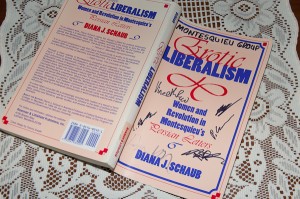During the spring semester, Robert Paquette, Charter Fellow of the Alexander Hamilton Institute for the Study of Western Civilization (AHI), supervised nine intrepid undergraduates who participated in a pioneering group independent study that required serious engagement with Charles-Louis de Secondat, Baron de La Brède et de Montesquieu (1689-1755). Montesquieu is, arguably, the foremost foreign individual influence on the meaning of republicanism in the political thinking that created the United States and framed and ratified the Constitution. No thinker is more frequently referenced in notable political writings in the United States from 1760 to 1805; no political thinker is more frequently referenced in The Federalist. Madison in his celebrated essay #10, though he does not mention Montesquieu by name, frontally challenges his assertion in Book 8, chapter 16: “It is in the nature of a republic to have only a small territory; otherwise it can scarcely continue to exist.”
Students in the group independent study read cover-to-cover, the 700+ pages of the Cambridge translation of Spirit of the Laws as well as Thomas L. Pangle, Montesquieu’s Philosophy of Liberalism: A Commentary on the Spirit of the Laws (1973) and essays by Paul Carrese, Professor of Political Science, Air Force Academy and author of The The Cloaking of Power: Montesquieu, Blackstone, and the Rise of Judicial Activism (2003); Rebecca Kingston, Professor of Political Science, University of Toronto and author of Montesquieu and the Parlement of Bordeaux (1996); Barry Shain, Professor of Political Science, Colgate University and author of The Myth of American Individualism (1996); and Diana Schaub, Professor of Political Science, Loyola University, Maryland, and the author of Erotic Liberalism: Women and Revolution in Montesquieu’s Persian Letters (1995).
The AHI sponsored appearances by Carrese, Kingston, Shain, and Schaub who discussed their scholarship on Montesquieu in intensive conversations with students and invited guests during Leadership Dinners at the AHI. In addition, the Montesquieu Group featured lectures by AHI Charter Fellow James Bradfield on “Montesquieu’s Understanding of Money and Economics” and by Resident Fellow Chris Hill on “Montesquieu’s Understanding of Medieval History and the Feudal Law.” Eismeier Fellow Dr. David Frisk, a Ph.D. in political science from the Claremont Graduate University, participated in the course along with the students and served as a resource for them during the semester.
Montesquieu’s Spirit of the Laws, published in 1748, stands as one of the greatest monuments created by the deliberative brilliance of the eighteenth-century Enlightenment. Montesquieu believed that the seemingly endless variety of institutions and moral systems around the globe were more than random patterns and could be subjected to rational analysis to reveal basic structure and animating force. Montesquieu’s magnum opus by no means opens its treasures easily to the pedestrian mind. At a time of censorship and religious persecution, Montesquieu composed his books and chapters in Spirit of the Laws as if he first assembled a puzzle and then disassembled it to be purposively obscure. According to some scholars, the book sprawls and, perhaps, flails at times. In attempting to examine peoples across the globe, he uses sources uncritically. His categorical schemes look to modern readers as too arbitrary and reductionist. Key insights remain undeveloped or underdeveloped. He fails to draw needed distinctions in discussing complex social phenomena. While some of the criticism has merit, a fair examination must take into account the limitations of Montesquieu’s time and that Montesquieu himself understood his intellectual work as opening a door to future projects that would, like his, study timeless questions.
“The Spirit of the Laws is among the most challenging texts I have ever encountered, said Dean Ball, one of the undergraduate participants. “I cannot recall struggling with any serious thinker more than Montesquieu. Yet as I met each week with other passionate students to dissect the book piece by piece, and as we periodically discussed the work more broadly with a range of the world’s finest Montesquieu scholars, I came gradually to see the genius of The Spirit of the Laws. It is a project that can only be conceived as a whole—to abridge it is to rob it of its purpose. No work of political theory I have ever read is more deserving of a singularly focused, semester-long study than The Spirit of the Laws. It has been one of the most rewarding experiences of my academic career.” “It is hard to put into words the new perspective I have gained from Montesquieu and the enjoyment and insight I have drawn from every other AHI event I have been a part of,” added Paul Carrier. For Scott Milne, The Montesquieu class was challenging and engaging, and I’m very glad I had the opportunity to take it.” Besides Ball, Milne, and Carrier, the students included Marta Johnson, Mary Farrington, Taylor Casey, Patrick English, Vineeth Devi Prasad Rao, and Kevin Anglim.


Leave A Comment